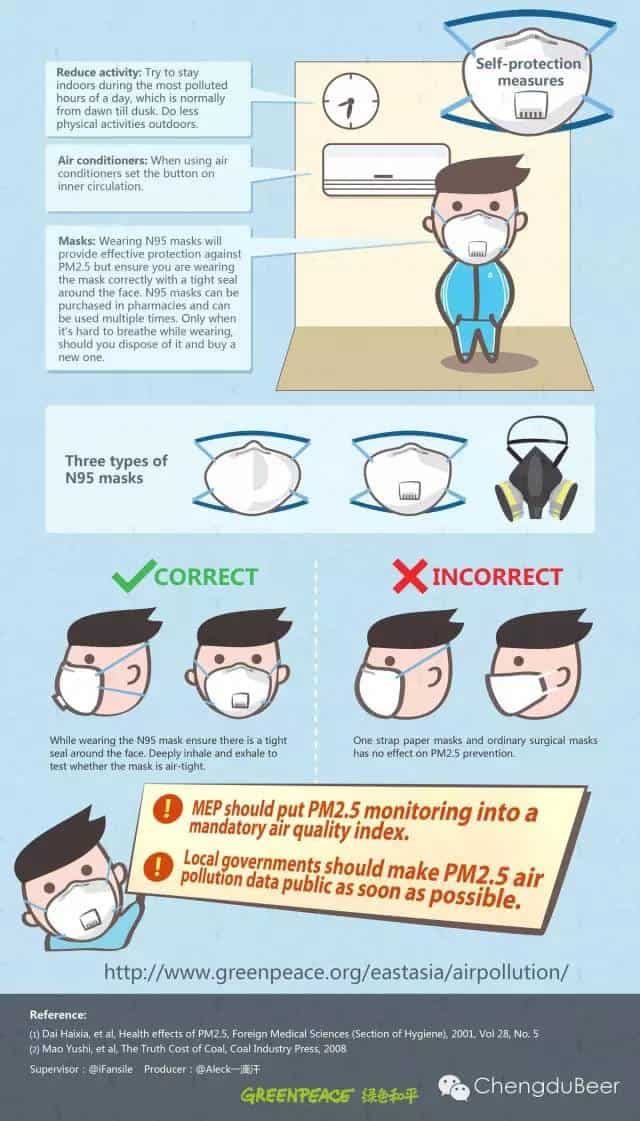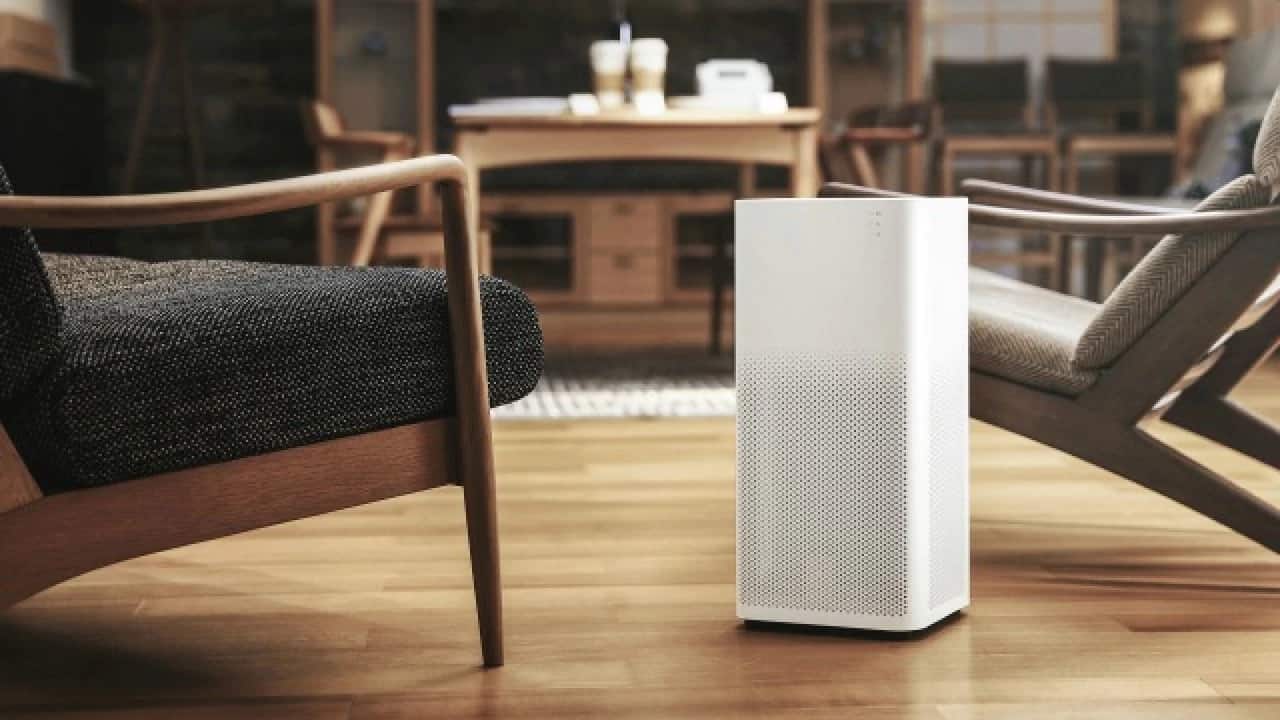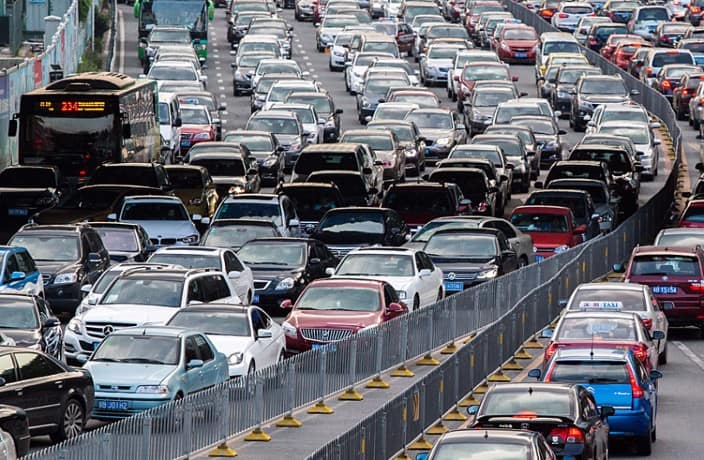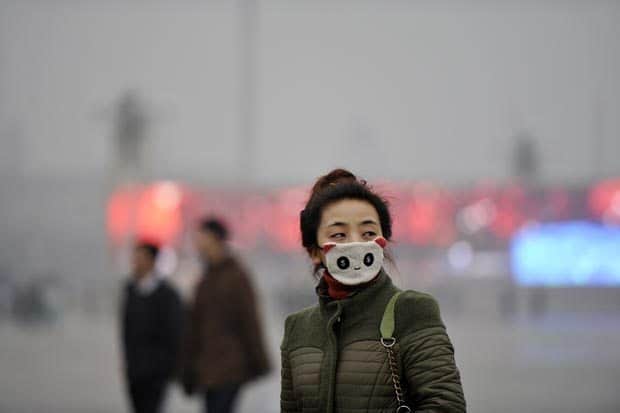Here’s How to Survive Winter Pollution in Chengdu
• Winter is well and truly on the way in Chengdu, and with this icy blast of weather, we’ve been blessed with another winter special; grey skies, and high AQI.
• Chengdu generally experiences quite high levels of pollution in winter: a mix of increased power usage, motor pollution, close proximity to industry, and unlucky topography are just a few reasons why. The winter tends to bring the highest AQI (Air Quality Index) readings, causing hard-to-ignore damage to both our health and our moods.
• But it must be said that because of government efforts to move factories out of residential areas, amongst other things, it has, on average, gotten better over the years. Unlike some regions in China’s Northeast, which experience huge peaks and troughs, Chengdu generally has a continuous moderate-to-high pollution level throughout the season.
• Whilst we don’t all have the luxury of escaping the city when it gets bad, we are luckily more equipped than ever to monitor and protect ourselves from pollutants. As awareness increases of the dangers of PM2.5s (small particles believed to be the most damaging to our health), so does the range of products and services that can help – and some are more affordable than you’d think.
• The pollution can be especially dangerous for sensitive groups: children, the elderly and pregnant women. Here are some tip how to keep safe this winter:

1) Know the Air Quality
Luckily we more equipped than ever to monitor and protect ourselves from pollutants. As awareness increases of the dangers of PM2.5s (small particles believed to be the most damaging to our health), so does the range of products and services that can help – and some are more affordable than you’d think. Your health during the pollution will depend on whether you make sensible decisions – so it’s important to keep track of the air quality daily.
Your health during the pollution will depend on whether you make sensible decisions – so it’s important to keep track of the air quality daily. Some air purifiers tell you the air quality of the room, but they can’t tell you the air quality where you’re actually sitting or sleeping, only the air around the purifier. Luckily there are many great stand alone Smart monitors available, varying in price and range of things they can measure.
The easiest way is to download one of the free apps available for both Apple and Android phones that track the pollution levels. There are many great apps, but we like ‘Air Matters: Global Air Quality & Pollen Data’ as it gives us the local reading from different districts in Chengdu. You can also use the app to compare air quality globally. There are also many websites that can give you up to date PM2.5 readings. If you’re a twitter user, follow @CGChengduAir which regularly tweets pollution updates You can also use the app to compare air quality globally throughout the day.
For simplicity’s sake, we find the Laser Egg by Kaiterra (discontinued at the end of 2022, though still available on Taobao for around 750RMB) both user friendly and cost efficient, and also has a useful Mini-Program. It displays the PM2.5 reading on an LED screen (so there’s no need to check an app like some of the others, although it can also be synced to your phone) and it can be unplugged to measure air quality on the move.
2) Wear A Mask…and make it a good one
…and make it a good one. Luckily since Covid-19 we’re more clued up about masks than ever. Terms like FFP2 and N95 are confusing but refer to the differing amount of airborne particles that the mask can remove.
European mask standards (EN143 & EN149) will categorise masks into FFP1, FFP2 and FFP3 which remove 80%, 94% and 99% respectively. American standards use a slightly more intuitive system N95, N99 and N100 removing 95%, 99% and 100% of particles.
We would normally recommend the 3M N95 masks, the general gold standard for disposable masks (around 80RMB for 50 masks on JD.com). Alternatively, Californian company Vogmask make less industrial, high quality fabric masks, which can be ordered on Taobao.com for 80-200RMB offering around 200 hours of protection.
If you are doing activity outdoors, wearing a mask is important. For cycling or running along main roads or in areas with construction –Respro masks are great, though be careful with fakes on Taobao. Totobobo also make great masks with replaceable filters (currently sold out on JD.com) but we found them less comfortable. We are yet to find anything that really allows us to take in enough air during a run – ID Masks say they specialise in this, it might be worth a try.
Lastly make sure it fits. Whichever mask you choose, and there are hundreds on the market, it’s vital it fits well. Check there are not gaps for air leakage. There are plenty of videos online to show you how to fit masks properly.

3) Purify the Air in Your Home & Office
Buy an air purifier:
The first step is to get the right size purifier for your space:
Most purifiers come with a recommended room size (适用面积) in square meters or they mention airflow rate (风机空载风量), often written as CADR, and listed as cubic meters per hour. An effective air purifier should replace the air in your room around 5 times an hour (although this depends on the CADR speed) so to roughly calculate this multiply the floor space, by the room height, by five and check your air flow rate is enough for your room or apartment.
XiaoMi offer a Smart air purifier that can be turned on by your phone before you get home with different machines for different sized spaces from 250RMB. Smart Air offer a cost friendly option (although it’s no beauty) from 180RMB which is very effective in smaller spaces (available at smartairfilters.com).
Air purifiers become effective about ten minutes after being turned on in your home and sealing your windows with polythene sheets and shutting your doors will prevent leakages while your purifier is on. Keep track if the filters in your purifier need changing – some get more efficient with age and some have a surprisingly short lifespan.
Air purifiers become effective about ten minutes after being turned on in your home and sealing your windows with polythene sheets and shutting your doors will prevent leakages while your purifier is on. Keep track if the filters in your purifier need changing – some get more efficient with age and some have a surprisingly short lifespan.

Other ways to help purify your home:
There’s lots of misinformation out there about plants – and other more…holistic ways to clean your air. But these DO NOT help protect against PM2.5s.
Research released by NASA names Spider Plants (Chlorophytum Comosum), Devil’s Ivy (Epipremnum Aureum), Peace Lily (Spathiphylly, ‘Mauna Loa) and the Variegated Snake Plant (Sansevieria trifasciata) as especially good for your home, removing benzene, and formaldehyde from the air – but they’re more likely to spruce up your apartment than your lungs. Beeswax candles and Himalayan Salt lamps are also thought by some as having air cleaning capabilities. But we’ve put ours away, with our dreamcatchers.

4) Make Good Decisions:
Whilst you can’t do anything to change the air quality outside, you can make good decisions to minimize your exposure to it:
Smoking: This might seem glaringly obvious – but in a city where smoking is so cheap and engrained in both dining and business culture, sitting in a bar without a cigarette might feel like an alien idea. However cutting out smoking is a sure fire way to improve your health.
Avoid Rush Hour: If you travel by bike or on foot, try to avoid busy roads during rush hour. Places like the first and second ring road and Renmin South Road have particularly toxic rush hours between 4-7pm, with 5% more cars on the road than last year. Taking the subway to cut across the city can really minimize your exposure to the pollution.
Exercising: There are conflicting opinions about which AQI level you should stop cardio activity outside. There are those that believe all exercise is more beneficial than not doing it at all, no matter what the air quality. Whatever view you take, it makes sense to monitor the AQI, time your workouts effectively and use side roads and river paths to avoid direct traffic fumes. Whilst most gyms here still don’t have purifiers, indoor air generally has around 50% less pollutants than the air outside.

A note from the editor: We know this winter might be tough for many people, who are spending another year away from family – which gets especially hard in the lead up to the holiday season. Remember, you are not alone if you’re feeling a bit down. Reach out to the community, take some vitamin D, get a TV box (those festive adverts!), and try to get some exercise. Spring will be here before you know it. We love you!
Air pollution’s long term health impacts often build up slowly over time, but even if you’re not in Chengdu for the long run, it’s still not a bad idea to take precautions and make good decisions. Keep these tips in mind this winter to keep the pollution woes at bay!



Pingback:English Language Films this February in Chengdu
Pingback:7 Things to Know Before Coming to Chengdu | Chengdu-Expat.com